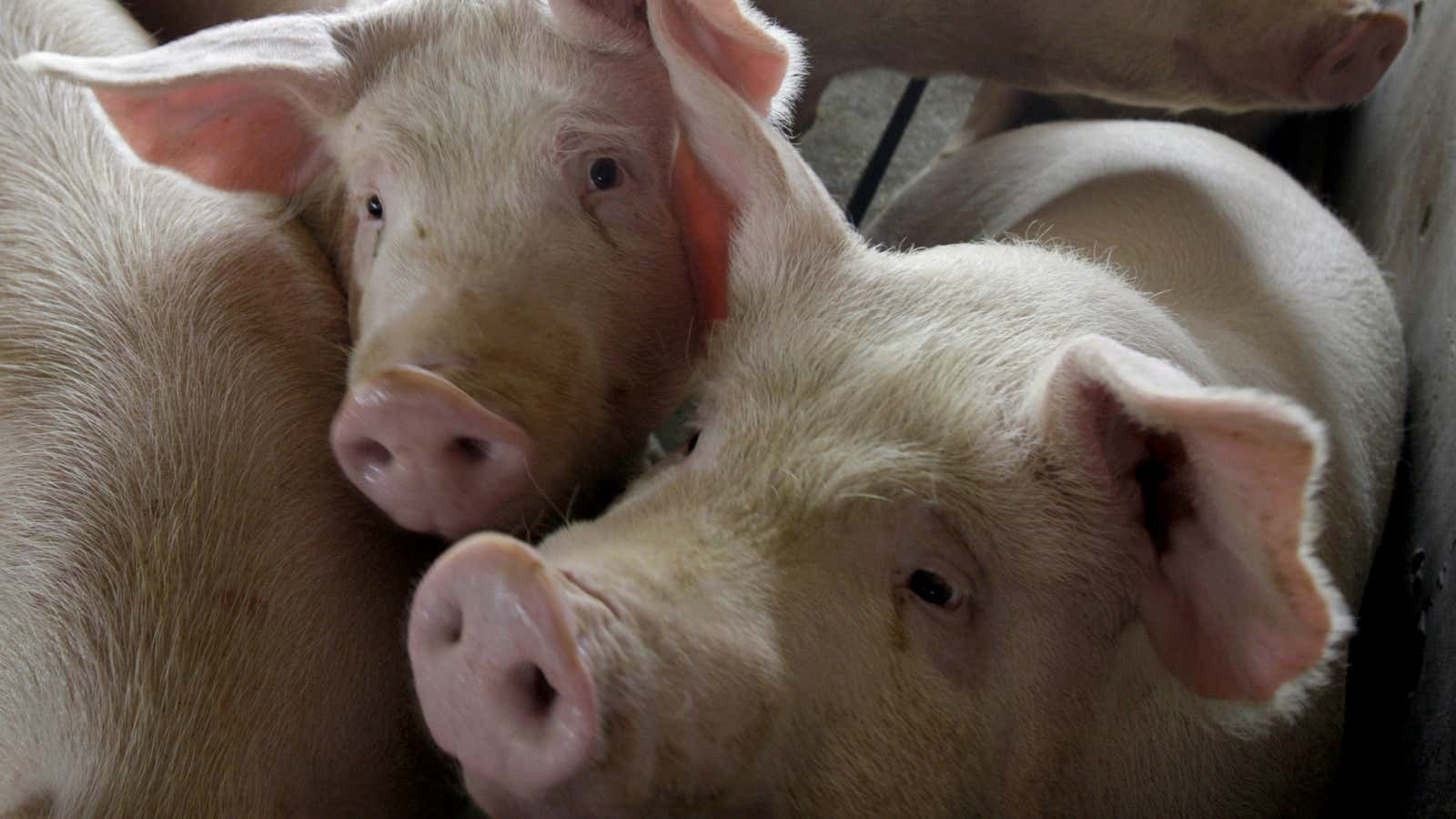Most people in the US have likely never heard of ractopamine, a controversial growth drug fed to an estimated 70% of American hogs. But in Taiwan, where any pork products made from pigs raised on it are banned, it’s a major issue in this Saturday’s (Jan. 16) presidential election.
Pork is one of the country’s top agricultural products, and when there were indications that the ban might be lifted in 2012, thousands of demonstrators crowded into the streets, many sporting Uncle Sam hats in protest, The Economist reported. In the end, a compromise was reached: Taiwan would take America’s ractopamine-fed beef as long as residues in the meat were below certain levels, but such pork was still verboten.
Now, American pork is now back on the table.
In the first televised presidential debate, held on December 26, Eric Chu of the Kuomintang party and James (Chu-Yu) Soong of the People First Party said they wanted to keep the ban, mostly citing food safety, Asia Times reported. “Public health should not be sacrificed for economic development,” Soong said. But the frontrunner, Tsai Ing-wen of the Democratic Progressive Party, called for learning from Japan and Korea—both of which accept US pork. Pressed on the topic at the next debate, Tsai ”would not confirm [whether] she would or wouldn’t lift the ban,” according to Global Meat News.
To some experts, this is really a story about US-Taiwan trade relations. They say the allowance of American beef shows that the issue isn’t the ractopamine itself, but Taiwan’s protectionist concerns. ”Taiwan has a pig industry but not a cattle industry,” Brett Stuart of market analysis firm Global AgriTrends explained to Quartz. (Elanco, which manufactures the branded version of ractopamine, is a client of Global AgriTrends.)
In 2013, the approximately 14,400 square mile (36,000 square kilometer) island produced about 887,000 tonnes (approx. 967,000 tons) of pork, according to the Food and Agriculture Organization of the United Nations, meeting 94% of its own needs. Letting in cheap American pork could cause major economic problems. By comparison, the country produced only 6,000 tonnes of beef.
Stuart added that the ban is in violation of Taiwan’s World Trade Organization commitments to free and open trade.
But health professionals and consumers say they are concerned about the drug’s safety. Ractopamine is a beta-agonist, a drug originally developed to treat human asthma that also helps animals develop more muscle instead of fat. This helps farmers meet the consumer demand for leaner meat and get their pigs heavier on less feed. But questions about its safety, for both the animals and the humans eating them, abound.
“The drug has triggered more adverse reports in pigs than any other animal drug on the market,” Helena Bottemiller reported for the Food & Environment Reporting Network in 2012. It has barely been tested on people—just one study of six men, one of whom withdrew early after experiencing negative health effects. Ractopamine is banned in more than 100 countries, but the National Pork Producers Council, the National Pork Board and Elanco point to approvals from bodies including the US Food and Drug Administration and the World Health Organization as evidence of the drug’s safety.
Like animal welfare and food safety advocates in the US, many Taiwanese don’t trust those certifications. “From a medical perspective, I would recommend that the new government keep restrictions in place if possible,” Yang Chen-chiang, director of clinical toxicology at Taipei veterans hospital, told the BBC. A 2012 poll found that 71% of Taiwanese citizens were in favor of the ban, even if it meant risking the country’s relationship with the US, according to The Economist. ”Taiwan citizens’ aversion to the use of ractopamine in pork production” is listed as one of the ”key roadblocks to overturning restrictions” in a report published last week by the US-China Economic and Security Review Commission.
Whether the anti-US-pork sentiments are rooted in protectionism or safety concerns may become apparent soon enough. Thanks to China’s ban on ractopamine-fed pork, the US pork industry has been quietly, if slowly, moving away from the drug.
